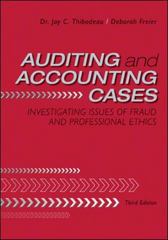The special investigative committee of the board of directors (the special committee) found no evidence that WorldComs
Question:
The special investigative committee of the board of directors (the special committee) found no evidence that WorldCom’s independent auditor, Arthur Andersen, in fact determined that WorldCom’s revenues or line costs were improperly reported. However, it did find that Andersen’s failure to detect these improprieties likely stemmed, in part, from a failure to demand supporting evidence for certain recorded transactions and some other missed audit opportunities that might have resulted in the detection of these improprieties.1 Andersen served as WorldCom’s auditor from at least as far back as 1990 through April 2002. In a presentation to the audit committee on May 20, 1999, Andersen stated that the firm viewed its relationship with WorldCom as a “long-term partnership,” in which Andersen would help WorldCom improve its business operations and grow in the future. In its Year 2000 audit proposal, Andersen told the audit committee that it considered itself “a committed member of [WorldCom’s] team” and that WorldCom was “a flagship client and a ‘crown jewel’” of its firm.2 In terms of the total fees charged to clients, WorldCom was one of Andersen’s top 20 engagements in 2000 and was the largest client of its Jackson, Mississippi, office. From 1999 through 2001 WorldCom paid Andersen \($7.8\) million in fees to audit the financial statements of WorldCom, Inc.; \($6.6\) million for other audits required by law in other countries; and about \($50\) million for consulting, litigation support, and tax services.3 Andersen’s Restricted Access to Information WorldCom allegedly severely restricted Andersen’s access to information; several of Andersen’s requests for detailed information and opportunities to speak with certain employees were denied. In fact, Andersen was denied access to World-Com’s computerized general ledger and had to rely on the printed ledgers.
According to the person in charge of security for WorldCom’s computerized consolidation and financial reporting system, WorldCom’s treasurer in 1998 instructed him not to give Andersen access to this computerized reporting system.4 In addition, senior management of WorldCom allegedly berated employees who disclosed unauthorized information to Andersen. For example, in October 2000 Steven Brabbs, the director of international finance and control for EMEA (Europe, Middle East, and Africa), told Andersen’s U.K. office that line cost expenses for EMEA were understated by \($33.6\) million because senior management had reduced its line cost accruals and that EMEA did not have any support for this entry. WorldCom’s senior vice president and controller David Myers reprimanded Brabbs and directed him never to do it again. In early 2002, after learning about another conversation between Brabbs and Andersen about a planned restructuring charge, Myers specifically instructed U.K. employees that “NO communication with auditors is allowed without speaking with Stephanie Scott [vice president of financial reporting] and myself. This goes for anything that might imply a change in accounting, charges, or anything else that you would think is important.” When Myers found out that the accountant had continued to speak with Andersen U.K. about the issue, he wrote the following message to the accountant:5 Do not have any more meetings with Andersen for any reason. I spoke to Andersen this morning and hear that you are still talking about asset impairments and facilities. I do not want to hear an excuse just stop. Mark Wilson has already told you this once. Don’t make me ask you again.
Although Andersen was aware that it was receiving less than full cooperation, it did not notify WorldCom’s audit committee...............
Case Questions
1. What is auditor independence, and what is its significance to the audit profession? Based on the case information, do you believe that Andersen violated the second general standard? Why or why not?
2. Refer to the responsibilities principle of Generally Accepted Auditing Standards (GAAS). Given the reluctance of WorldCom’s management team to communicate with Andersen, do you believe that Andersen exercised due care and professional skepticism in completing the audit? Why or why not?
3. In terms of audit effectiveness and efficiency, briefly explain the difference between substantive analytical procedures and substantive tests of details. Do you believe it was appropriate for Andersen to rely primarily on substantive analytical procedures? Why or why not?
4. Provide an example of both a preventive control and a detective control that could address the risk that a fraudulent top-side adjusting journal entry could be made by a member of management.
Step by Step Answer:

Auditing And Accounting Cases Investigating Issues Of Fraud And Professional Ethics
ISBN: 9780078110818
3rd Edition
Authors: Jay Thibodeau, Deborah Freier





